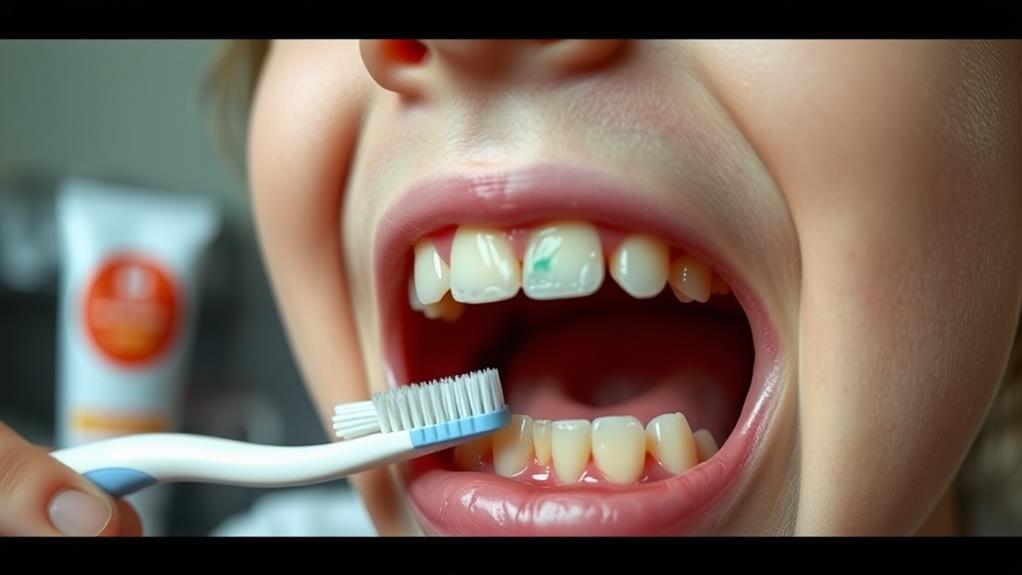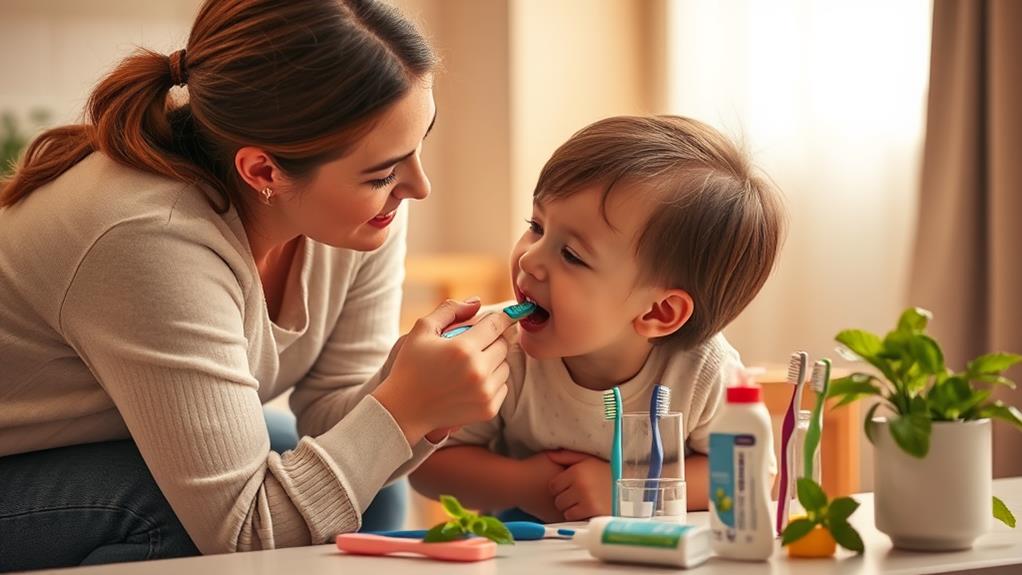You might be surprised to learn that bad breath in children isn't just a minor annoyance; it can indicate underlying issues. While poor oral hygiene is often the main culprit, factors like diet and hydration play significant roles too. It's essential to understand what might be causing your child's halitosis and how you can address it effectively. As you navigate this topic, consider the simple yet effective remedies that could make a difference, but what happens when these solutions don't work?
Understanding Bad Breath in Children

Understanding bad breath in children can be crucial for both parents and caregivers. Bad breath, or halitosis, is pretty common and can come from different causes. You might notice that your child's breath smells less than fresh after a pizza party or a garlic-filled dinner. Strong-smelling foods can hang around in their mouth and bloodstream, leading to temporary bad breath.
But it's not just about what they eat. Poor oral hygiene plays a big role too. If your child isn't brushing and flossing regularly, plaque buildup can happen. This sticky film collects odor-causing bacteria, and trust me, that's no fun for anyone!
Additionally, if your child often breathes through their mouth or doesn't drink enough water, it could lead to dry mouth. Saliva helps keep the mouth clean, and when it's low, bad breath can sneak in.
Sometimes, persistent halitosis might even hint at medical conditions, like respiratory infections. If you're worried, it's a good idea to chat with a healthcare professional.
Don't fret! There are plenty of remedies to keep that breath fresh and sweet!
Common Causes of Halitosis
Many factors can contribute to halitosis in children, and recognizing these causes is key to addressing the issue effectively. One of the most common culprits is poor oral hygiene. If your child isn't brushing and flossing regularly, plaque builds up, allowing odor-causing bacteria to thrive.
Diet plays a role too! Eating strong-smelling foods like garlic and onions can lead to temporary bad breath. The sulfur compounds in these foods can linger, making it hard for your little one to escape the smell.
Dry mouth is another sneaky cause. If your child is dehydrated or tends to breathe through their mouth, saliva production decreases, which means less natural cleaning action in the mouth.
Medical conditions, such as acid reflux or diabetes, can also contribute to halitosis in children by changing the environment in the mouth or introducing bacteria.
Additionally, allergies or sinus infections can lead to postnasal drip, making bad breath even worse when combined with mouth breathing.
If you're concerned, don't hesitate to consult pediatric dentists. They can help identify the reasons for your child's bad breath and suggest effective remedies!
Impact of Poor Oral Hygiene

Poor oral hygiene can lead to a host of problems for your child, with bad breath often being the most noticeable. When kids don't brush or floss regularly, plaque accumulation happens, which creates the perfect home for odor-causing bacteria.
These little troublemakers thrive when food particles get trapped between teeth and gums, turning your child's mouth into a stinky environment.
To combat this, make sure your child brushes twice a day for two minutes and flosses at least once daily.
Don't forget about tongue scraping—bacteria can hang out on the tongue's surface, contributing to that not-so-pleasant halitosis.
Regular dental check-ups are also super important. They help catch any oral hygiene issues early on, preventing bad breath before it starts.
Plus, it's a great chance to teach your child about the importance of maintaining good oral hygiene.
Dietary Influences on Breath
What your child eats can play a significant role in their breath quality. You mightn't realize it, but certain foods can create some funky odors! For instance, garlic and onions release sulfurous compounds during digestion, which can lead to bad breath that lingers even after brushing.
Also, high-protein foods like fish and meat can cause problems, too, as they break down in the mouth and contribute to halitosis.
To keep your child's breath fresher, encourage them to munch on crunchy fruits and vegetables, like apples and carrots. These tasty snacks not only taste great but also help clean teeth and promote oral health. Plus, they can help neutralize bad breath!
It's also important to limit sugary snacks and starchy foods. Those treats can encourage bacteria growth in the mouth, making the breath worse.
And don't forget about saliva production! Drinking water regularly helps wash away food particles and bacteria, keeping bad breath at bay.
Importance of Hydration

Keeping your child well-hydrated is essential for maintaining fresh breath. When your child drinks plenty of water, it helps with saliva production, which is like nature's mouthwash. Saliva cleanses the mouth, washing away food particles and bacteria that can cause bad breath.
If your child doesn't drink enough, they might experience dry mouth, also known as xerostomia. This can lead to halitosis, a fancy term for bad breath, because there's less saliva to keep things fresh.
Encouraging your little one to sip on water throughout the day, especially after meals or strong-smelling snacks, can make a big difference.
You might even suggest they chew sugarless gum! That can help stimulate saliva production, fighting off that pesky dry mouth and keeping odors at bay.
Effective Oral Care Techniques
Maintaining proper hydration is just one part of the equation when it comes to fresh breath in children. To really tackle bad breath, an effective oral hygiene routine is key! Make sure your child brushes twice a day for two minutes. Supervise until they're about seven or eight, as they still need a little help with plaque removal.
Don't forget about flossing! It's crucial to remove those sneaky food particles stuck between teeth that brushing might miss.
And here's a neat trick: using a tongue scraper or brushing the tongue can zap away odor-causing bacteria that love to hang out there.
Storage matters, too! Keep toothbrushes in a dry spot and replace them every three months, or when they look frayed. This helps minimize bacterial growth and keeps their teeth squeaky clean.
Lastly, consider incorporating mouthwash into their routine; it can help reduce bacteria and freshen breath. Just make sure it's safe for your child's age.
When to Seek Professional Help

Persistent bad breath in children can be more than just a nuisance; it might signal an underlying health issue. If your child's bad breath sticks around, even after keeping up with good oral hygiene, it's time to consult with your child's healthcare professional. They can help figure out if there's something more serious going on.
Keep an eye out for any other symptoms, like tooth pain, swollen or bleeding gums, or even a fever. If your child experiences any of these, don't wait around—get them to a dentist ASAP! These could be signs of infections that need quick attention.
Also, if you notice changes in appetite or unusual behaviors, it's worth talking to a pediatrician.
Regular dental check-ups are super important, too. They help catch any dental problems early on, which could be causing that pesky bad breath. Plus, if there's a family history of dental or medical issues, specialized evaluations might be needed.

